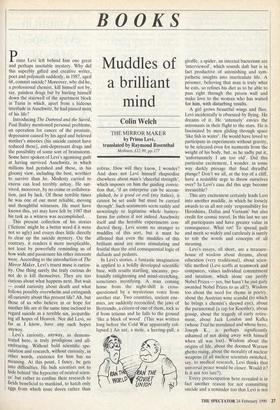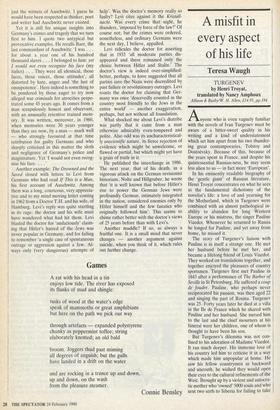BOOKS
Muddles of a brilliant mind
Colin Welch
THE MIRROR MAKER by Primo Levi, translated by Raymond Rosenthal
Methuen, £12.99, pp.I77
Primo Levi left behind him one great and perhaps insoluble mystery. Why did this superbly gifted and creative writer, poet and polymath suddenly, in 1987, aged 68, commit suicide? Moreover, why did he, a professional chemist, kill himself not by, say, painless drugs but by hurling himself down the stairwell of the apartment block in Turin in which, apart from a hideous interlude in Auschwitz, he had passed most of his life?
Introducing The Damned and the Saved, Paul Bailey mentioned personal problems, an operation for cancer of the prostate, depression caused by his aged and beloved mother's miseries (his suicide cannot have reduced these), anti-depressant drugs and the possibility of some sort of brainstorm. Some have spoken of Levi's agonising guilt at having survived Auschwitz, in which millions had perished and these, in his gloomy view, including the best, worthier to survive than he. Modesty carried to excess can lead terribly astray. He sur- vived, moreover, by no crime or collabora- tion, just by luck. Of those terrible times he was one of our most reliable, moving and thoughtful witnesses. He must have known this, yet may have felt by 1987 that his task as a witness was accomplished.
This present collection of his stories ('fictions' might be a better word if it were not so ugly) and essays does little directly to clear up the suicide mystery. On the contrary, it renders it more inexplicable, not least by powerfully reminding us of how wide and passionate his other interests were. According to the introduction of The Mirror Maker, Levi's truest muse is curios- ity. One thing surely the truly curious do not do is kill themselves. They are too curious about what happens next. But wait — could curiosity about death and what follows possibly overwhelm and extinguish all curiosity about this present life? Ah, but those of us who believe in or hope for another life are at the same time inclined to regard suicide as a terrible sin, jeopardis- ing all hopes of Heaven. Nor did Levi, so far as I know, have any such hopes anyway.
Levi's curiosity, anyway, as demons- trated here, is truly prodigious and all- embracing. Without bold scientific spe- culation and research, without curiosity, in Other words, existence for him has no meaning. At this point, I fancy, he gets into difficulties. He bids scientists not to hide behind 'the hypocrisy of neutral scien- ce' but rather to confine their research to fields beneficial to mankind, to hatch only eggs from which issue doves rather than
cobras. How will they know, I wonder? And does ' not Levi himself rhapsodise elsewhere about man's `cheerful strength', which imposes on him the guiding convic- tion that, 'if an enterprise can be accom- plished, be it good or evil (my italics), it cannot be set aside but must be carried through'. Such sentiments seem rashly and unwittingly to legitimise whole battery- farms for cobras if not indeed Auschwitz itself and the horrible experiments con- ducted ther9. Levi seems no stranger to muddles of this sort, but it must be affirmed that even the muddles of this brilliant mind are more stimulating and fruitful than the arid consequential logic of dullards and pedants.
In Levi's stories, a fantastic imagination is applied to a boldly developed scientific base, with results startling, uncanny, pro- foundly enlightening and mind-stretching, sometimes mystifying. A man coming home from the night-shift is cross- questioned by • a mysterious voice from another star. Two countries, ancient ene- mies, are suddenly reconciled; the jaws of Bertrando, a citizen of one of them, lock as if from tetanus and he falls to the ground 'like a block of wood'. (This was written long before the Cold War apparently col- lapsed.) An ant, a mole, a herring-gull, a giraffe, a spider, an internal bacterium are interviewed', which sounds daft but is in fact productive of astonishing and sym- pathetic insights into inarticulate life. A prisoner, believing that man is truly what he eats, so refines his diet as to be able to pass right through the prison wall and make love to the woman who has waited for him, with disturbing results.
A girl grows beautiful wings and flies.
Levi incidentally is obsessed by flying. He dreams of it. He 'intensely' envies the astronauts in their flight to the stars. He is fascinated by men gliding through space 'like fish in water'. He would have loved to participate in experiments without gravity, to be released even for moments from the weight of his body, but, as he sadly put it, 'unfortunately I am too old'. Did this particular excitement, I wonder, in some way darkly presage that final dreadful plunge? Don't we all, at the top of a cliff, have a resistible urge to throw ourselves over? In Levi's case did this urge become irresistible? '
This airy excitement certainly leads Levi into another muddle, in which he loosely awards to us all not only 'responsibility for Hiroshima, Dallas and Vietnam' but also credit for cosmic travel. In this last we are all participants and have greater value in consequence. What rot! To spread guilt and merit so widely and carelessly is surely to rob the words and concepts of all meaning.
Levi's essays, all short, are a treasure- house of wisdom about dreams, about education (very traditional), about scien- tific method (Levi scoffs at teamwork and computers, values individual commitment and intuition, which alone can justify Nobel Prizes — yes, but hasn't he just gaily awarded Nobel Prizes to us all?). Wisdom too about the need for rhyme in poetry, about the Austrian wine scandal (to which he brings a chemist's shrewd eye), about the paranormal (a rap for Koestler), about gossip, about the tragedy of early retire- ment, about Jack London and Kafka
(whose Trial he translated and whose hero,
Joseph K., is perhaps significantly ashamed of not doing away with himself when all was lost). Wisdom about the origins of life, about the doomed Warsaw ghetto rising, about the morality of nuclear weapons (if all nuclear scientists switched, say, to medical research, Levi thinks that universal peace would be closer. Would it? Is it not too late?).
Every preoccupation here revealed is in fact another reason for not committing suicide and a reminder too that Levi is not j tv.,1 the witness, of Auschwitz. I guess he would have been respected as thinker, poet and writer had Auschwitz never existed.
Yet it is still for unique insights into Germany's crimes and tragedy that we turn st to him. I quote two untypical but provocative examples. He recalls Baer, the last commandant of Auschwitz: 'I was . . for about a year one of his hundred thousand slaves. . I belonged to him: yet I would not even recognise his face (my italics) . . . They were all identical, those faces, those voices, those attitudes', all distorted by hate, anger and 'the lust of omnipotence'. Here indeed is something to be pondered by those eager to try now alleged war criminals for atrocities perpe- trated some 45 years ago. It comes from a man scrupulously honest and observant, with an unusually retentive trained mem- ory. It was written, moreover, in 1960, when memories were 30 years younger than they are now, by a man — mark well — who strongly favoured at that time retribution for guilty Germans and who sharply criticised in this matter the sloth and negligence of Germany's police and magistrature. Yet 'I would not even recog- nise his face. . .
Another example: The Drowned and the Saved closed with letters to Levi from Germans who had read If This is a Man, his first account of Auschwitz. Among them was a long, courteous, very apprecia- tive and to my mind moving letter coming in 1962 from a Doctor T.H. and his wife, of Hamburg. Levi's reply was quite startling in its rage: the doctor and his wife must have wondered what had hit them. Levi blasted the doctor for 'audaciously' claim- ing that Hitler's hatred of the Jews was never popular in Germany, and for failing to remember 'a single case of spontaneous outrage or aggression against a Jew. Al- ways only (very dangerous) attempts of
help'. Was the doctor's memory really so faulty? Levi cites against it the Kristall- nacht. Was every crime that night, he thunders, 'imposed by force of the law?' Of course not; but the crimes were ordered, nonetheless, and ordinary Germans were the next day, I believe, appalled.
Levi ridicules the doctor for asserting that in 1933 'all moderate parties dis- appeared and there remained only the choice between Hitler and Stalin.' The doctor's view is indeed over-simplified: better, perhaps, to have suggested that all parties save the Nazis were discredited by past failure or revolutionary outrages. Levi roasts the doctor for claiming that Ger- many was once 'deservedly counted as the country most friendly to the Jews in the entire world' — another exaggeration, perhaps, but not without all foundation.
What shocked me about Levi's diatribe was partly that it came from a man otherwise admirably even-tempered and polite. Also odd was its uncharacteristical- ly unscientific nature, its fierce rejection of evidence which might be unwelcome, or flawed or partial, but which might yet have a grain of truth in it.
He published the interchange in 1986. The next year, that of his death, in a vigorous attack on the German revisionist historians, Nolte and Hillgruber, he wrote that it is well known that before Hitler's rise to power the German Jews were profoundly German, intimately integrated in the nation, considered enemies only by Hitler himself and the few fanatics who originally followed him'. This seems to chime rather better with the doctor's views of 25 years before than with Levi's.
Another muddle? If so, as always a fruitful one. It is a small mind that never changes — another argument against suicide, when you think of it, which rules out further change.



















































 Previous page
Previous page